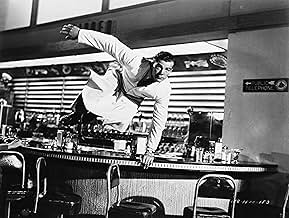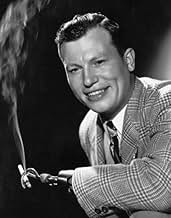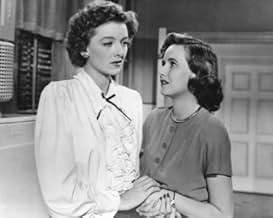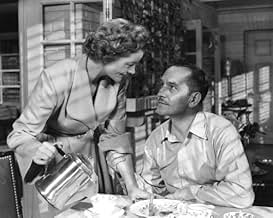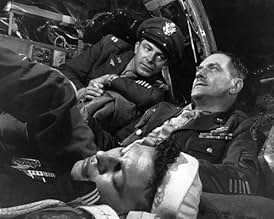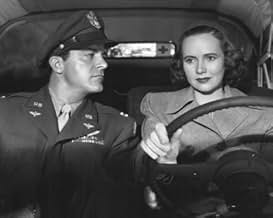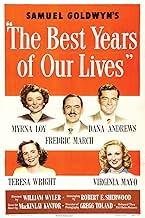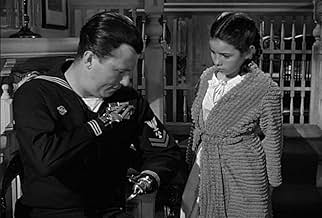Les Plus Belles Années de notre vie
- 1946
- Tous publics
- 2h 50min
Trois vétérans de la Seconde Guerre mondiale rentrent chez eux dans une petite ville de l'Amérique profonde et découvrent que leur famille et eux-mêmes ont irrémédiablement changé.Trois vétérans de la Seconde Guerre mondiale rentrent chez eux dans une petite ville de l'Amérique profonde et découvrent que leur famille et eux-mêmes ont irrémédiablement changé.Trois vétérans de la Seconde Guerre mondiale rentrent chez eux dans une petite ville de l'Amérique profonde et découvrent que leur famille et eux-mêmes ont irrémédiablement changé.
- Réalisation
- Scénario
- Casting principal
- Récompensé par 7 Oscars
- 25 victoires et 4 nominations au total
- Al Stephenson
- (as Frederic March)
Résumé
Avis à la une
Such a powerful film. At first the new lives of the soldiers seem to be facing small adjustments, such as their children's interest in "atomic energy" and "scientific efficiency". But soon we find that jobs are hard to find, and the wives and girlfriends sometimes met new people while the battles were fought.
Although a serious topic, the film has the right balance of entertainment and drama. It never gets outright depressing, and things like depression and suicide are overlooked. But it still remains a valuable lesson: as bad as dying in the war is, sometimes the transition back to normalcy can be just as damaging.
Although not one of the better known movies today (2014), "The Best Years of Our Lives" won seven Academy Awards in 1946, including Best Picture, Best Director (William Wyler), Best Actor (Fredric March), Best Supporting Actor (Harold Russell), Best Film Editing (Daniel Mandell), Best Adapted Screenplay (Robert Sherwood), and Best Original Score (Hugo Friedhofer). It still sits on the IMDb Top 250, just as it should.
William Wyler's direction is breathtaking. One of the most moving scenes occurs early on in the film, when Homer, the young disabled Navy veteran, arrives at his family home and stands for a moment on the front lawn. For that one second there is an exquisite stillness that communicates a depth of emotion that can't be expressed physically. Then, just as the tension becomes almost unbearable, Homer's little sister Louella comes to the front door and runs out to greet him. In a similar way, the scene where Al Stephenson comes home to his wife and children is so finely directed you can almost feel that you're in the apartment with them--that it's your husband or father come home to you from the war--and you're experiencing the sheer elation of their physical nearness.
This aspect of the film--its portrayal of the joys and hardships of post-war readjustment and the veterans' experience--is what makes it so enlightening, honest and powerful. As a young woman, I have never experienced wartime or had my father, brothers or friends go off to fight. The film moves swiftly but seamlessly from the initial joy of homecoming and reunion to the problems, anxieties and humiliations that the three veterans encounter as they attempt to build a new life for themselves and their families.
I found it interesting how the film tries to give a picture of the different socio-economic backgrounds of the three men, and show the emergence of an affluent, market-driven economy. While this in itself is not bad, different episodes in the film show how this economic approach can conflict sharply at times with enduring human values such as integrity and justice. Al's dealings with the young veteran Mr Novak, who comes to him for a service loan to buy a farm, and his later (slightly tipsy) speech to a business gathering show this. Al declares at the end of his speech that when the bank lends money to poor veterans it will be a financial gamble but "we'll be gambling on the future of this country".
The film's interweaving of the characters and their struggles never falters and is deeply satisfying. Even as Al and Milly, Homer and Wilma gradually move towards a happy resolution of their difficulties this positive strand of the film is counter-balanced by the focus on Fred, the courageous Air Force captain who, in the eyes of the commercial world is "unqualified", suitable only for a job at a soda fountain, and in the eyes of his war bride, Marie, is only wonderful when he's dressed up in his officer's uniform. Fred's situation seems only to deteriorate and at one point in the film, after he farewells his elderly father to leave town and look for work, the father finds the citations for Fred's medals and sits down to read them. As he reads the words describing Fred's bravery and dedication to duty while he was terribly wounded in his aircraft, Pat Derry's voice nearly breaks with pride and love for his son. The film beautifully juxtaposes Fred's unselfish conduct and willingness to make the ultimate sacrifice with the cold indifference of a country in peacetime that does not want him and seemingly has no place for him.
The actors are uniformly impressive and really make their characters come alive. Dana Andrews is especially outstanding together with two young actors making their debut, Harold Russell and Cathy O'Donnell, as Homer and Wilma. Personally, I loved Homer and Wilma's story the best among those of all the characters,and the resolution is a simple, sensitively shot scene that lifts the whole film to a new point of happiness, gratitude and release. Both Cathy O'Donnell and Teresa Wright are lovely, gifted actresses with a slightly understated style, that is perfectly suited to the film's restrained but powerful tenor. This is demonstrated especially well in the tense scene where Wilma tries to talk to Homer in the shed, and in the scene where Peggy confides her heartache to her parents.
One feature that adds significantly to the film's quality is Hugo Friedhofer's score. The music is remarkably fresh and undated, has a strong, classic sound, and is poignant without being too romantic or sentimental (a flaw often found in other 1940s film scores).
The producer, Samuel Goldwyn, reportedly said of this film: "I don't care if it doesn't make a nickel...I just want every man, woman and child in America to see it". Although I'm not American (I am Australian) I found this film, with its universal human themes and its portrayal of post-war readjustment, speaks to anyone who shares in this heritage of WWII. Tell others about this film--it is breathtaking, beautiful and brave. See it and remember.
The whole point of this film when it was released still makes perfect sense today, though I'm sure it doesn't have the same impact it did in those first years after World War II ended. Returning servicemen, with all kinds of backgrounds before and during the war, hit a wall coming home: wives who no longer loved them, jobs that had dried up, a culture that was foreign to them and that found them, these men, to be foreign themselves.
It wasn't a crisis to take lightly. These were the guys who were drafted to fight the enemy, and in going overseas they lost some of the best years of their lives, if not their lives. The country knew its debt in the abstract, but it also knew it in sons and husbands who really did come home and who had to face it all. This movie was both a reckoning for the sake of national healing and a brilliant drama that would be beautifully pertinent and therefore successful. And what a success, then and now.
The consummate Hollywood director William Wyler shows in this fast, long movie just what a master he is at working the medium. With Gregg Toland at the camera, Wyler makes a highly fluid movie, visual and dramatic and weirdly highly efficient. With the three main plots interweaving and depending on each other, the drama (and melodrama) build but never beyond plausibility. Wyler knew his audience wouldn't put up with pandering or cheap mistakes. Casting Harold Russell as Homer, knowing the audience would hear about how Russell really was a soldier who lost both hands in the war, was a huge step toward creating both empathy and credibility. It even practices a key theme in the move--to go beyond your bounds to make a difference, to give these guys a break and help them assimilate.
It's interesting how singular this movie is, trying to show the truth in these kinds of situations. The other post-war films about army and navy men fall into two large and dominating categories--war films and film noir. And it is film noir that comes closest to getting at the problem of the G.I. not reintegrating well, making it a whole style, brooding and spilling over with violence. "The Best Years of Our Lives" has a highly controlled and even contrived plot structure, but it aims to be honest and representative.
That it's remarkable formally--the way it is shot and edited and acted, top to bottom--is not surprise, given the heights that Hollywood had reached by then, and given that Wyler is easily the slickest of them all, in the best sense. That the movie makes such beautiful sense and really works as a story, a moving and heartwarming story without undue sappiness, is a whole other kind of achievement. A terrific, rich, full-blooded, uncompromised movie.
Definitely a family orientated movie (Cert U) this will appeal to and find favour with all ages, but don't start thinking that this is all gooey, slushy nonsense. There's some quite hard-hitting topics covered, even by today's standards and of course, with our minds on our current troops in Iraq/Afghanistan, equally relevant.
Multi-stranded, which each of the three G.I.'s immediate and extended families and friends being examined, it's about them coping, with varying degrees of success, with home life and getting jobs, now that the War is ended. It's the little observations and stories around them that are so fascinating, as the Heroes of yesterday are now anything but when it comes finding new purpose in a changed world.
The cast is exemplary, not necessarily the biggest stars of the day but the most believable and natural for their roles. Dana Andrews, Myrna Loy and Fredric Marsh are the ones most easily recognisable and their appearances convey a sort of reassuring familiarity and normality. They're all excellent, of course.
Though long, at nearly 3 hours, William Wyler's easy going but assured and tight direction keeps things flowing nicely and it never drags. This, my second viewing, is an enjoyable one as the first and if anything I'm more at ease with it.
Though obviously not as exciting or dramatic as other 'normal' war films, it's a tragedy that it's not more well known. I've never seen it to ever have been on TV, or to my recollection, even Sky Movies, for that matter. Any movie that won 7 Oscars and is currently no. 180 in the top 250 IMDb's films of all time, voted by its voters (us, the public) is hardly one of minority interest.
A friend I lent my DVD to watched it with his family and normally they only go for current films, or ones they know, but they not only enjoyed it, but felt enormously moved by it, too.
If you haven't seen The Best Years... yet, make a mental note to do so. Your life won't change by doing so, but it really is worth the 3 hours of it that it will take. You certainly can't say the same about every film out there....
Oscars Best Picture Winners, Ranked
Oscars Best Picture Winners, Ranked
Le saviez-vous
- AnecdotesFor his performance as Homer Parrish, Harold Russell became the only actor to win two Academy Awards for the same role. The Academy Board of Governors thought he was a long shot to win, so they gave him an honorary award "for bringing hope and courage to his fellow veterans through his appearance." Later in the ceremony, he won for Best Supporting Actor.
- GaffesWhen Al introduces his wife and daughter to Fred and Homer at Butch's, he refers to Dana Andrews as Homer and Harold Russell as Fred. This was intended as a consequence of Al being drunk.
- Citations
[after Peggy tells her parents that they never had any trouble in their relationship]
Milly Stephenson: "We never had any trouble." How many times have I told you I hated you and believed it in my heart? How many times have you said you were sick and tired of me; that we were all washed up? How many times have we had to fall in love all over again?
- Crédits fousThe character played by Ray Teal (the Axis sympathizer whom Homer Parrish attacks at the soda fountain) is listed in the credits as "Mr. Mollett". However, the character's name is never mentioned or otherwise alluded to.
- Versions alternativesThe film was modified to play on a wide screen and reissued on February 3, 1954.
- ConnexionsEdited into Pilote du diable (1950)
- Bandes originalesAmong My Souvenirs
(1927) (uncredited)
Music by Edgar Leslie
Lyrics by Lawrence Wright
Played on piano by Hoagy Carmichael
Meilleurs choix
Détails
- Date de sortie
- Pays d’origine
- Langue
- Aussi connu sous le nom de
- Los mejores años de nuestras vidas
- Lieux de tournage
- Société de production
- Voir plus de crédits d'entreprise sur IMDbPro
Box-office
- Budget
- 2 100 000 $US (estimé)
- Montant brut aux États-Unis et au Canada
- 23 650 000 $US
- Montant brut mondial
- 23 667 133 $US
- Durée2 heures 50 minutes
- Couleur
- Rapport de forme
- 1.37 : 1
Contribuer à cette page



